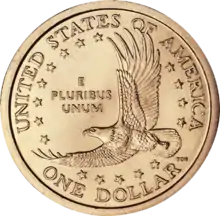2000 Sacagawea dollar – Washington quarter mule
The 2000 Sacagawea dollar – Washington quarter mule is an error coin featuring the obverse of a Washington quarter (specifically a 50 State quarter) and the reverse of a Sacagawea dollar struck on a gold-colored dollar coin planchet. It is one of the first known authentic mule coins to be released into circulation by the United States Mint.[2]
United States | |
| Value | .25 / 1 United States dollar |
|---|---|
| Mass | 8.100 g (0.26 troy oz) |
| Diameter | 26.49 mm (1.043 in) |
| Thickness | 2.00 mm (0.079 in) |
| Edge | Plain |
| Composition | Core: 100% Cu Cladding: 77% Cu, 12% Zn, 7% Mn, 4% Ni Overall: 88.5% Cu, 6% Zn, 3.5% Mn, 2% Ni[1] |
| Years of minting | 2000 |
| Mint marks | P |
| Obverse | |
 | |
| Design | George Washington |
| Designer | John Flanagan (original) / William Cousins (modification to Flanagan's design) |
| Design date | 1999 |
| Reverse | |
 | |
| Design | Soaring eagle |
| Designer | Thomas D. Rogers |
| Design date | 2000 |
History
Mule coins were deliberately produced by US Mint employees for sale to coin collectors in the mid-1800s.[3] However, no authentic (accidental) mules of United States currency were known to exist. This changed in the 1990s, when a Lincoln cent (dated 1993-D) with the reverse of a Roosevelt dime were discovered.[note 1][5] In 2000, Frank Wallis of Arkansas discovered a Sacagawea dollar with the obverse of a Washington quarter.[6]
List of known coins
As of September 2019, 19 examples have been confirmed, 16 of which are owned by a coin collector named Tommy Bolack.[7][8] Three different die pairs have been identified among the examples.[7]
| Coin | Die pair | Discovered | Notes |
|---|---|---|---|
| 1 | #1 | May 2000 | The "Discovery" specimen, owned by Tommy Bolack. Graded MS-66 by the PCGS. |
| 2 | #2 | before July 2000 | Owned by Bolack. Graded MS-67 by the NGC. |
| 3 | #2 | before August 6, 2000 | Owned by Bolack. Graded MS-66 by the NGC. |
| 4 | #1 | before September 2000 | Graded MS-65 by the PCGS. |
| 5 | #3 | September 2000 | Graded MS-67 by the NGC. |
| 6 | #1 | June 2000 | Owned by Bolack. Graded MS-66 by the PCGS. |
| 7 | Unknown | July 2000 | Owned by Bolack. Graded MS-64 by the NGC. |
| 8 | #1 | before June 2001 | Owned by Bolack. Graded MS-66 by the PCGS. |
| 9 | #1 | before June 2001 | Owned by Bolack. Graded MS-65 by the PCGS. |
| 10 | #3 | summer 2000 | Owned by Bolack. Graded MS-65 by the NGC. |
| 11 | #1 | before July 2011 | Graded MS-67 by the NGC. |
| 12 | #1 | before August 2012 | Owned by Bolack. Graded MS-67 by the NGC. |
| 13 | #1 | before 2005 | Owned by Bolack. Graded MS-67 by the NGC. |
| 14 | #1 | before January 2013 | Owned by Bolack. Graded MS-66 by the PCGS. |
| 15 | #1 | before July 2016 | Owned by Bolack. Graded MS-66 by the PCGS. Featured colorful toning. |
| 16 | #1 | before May 2017 | Owned by Bolack. Graded MS-66 by the PCGS. |
| 17 | #1 | before March 22, 2018 | Owned by Bolack. Graded MS-67 by the NGC. |
| 18 | #1 | before January 10, 2019 | Owned by Bolack. Graded MS-67 by the NGC. The die pairing is not noted on the NGC label. |
| 19 | #1 | before March 2017 | Owned by Bolack. Graded MS-67 by the NGC. The die pairing is not noted on the NGC label. |
Notes
- A similar Lincoln cent/Roosevelt dime mule dated 1999 is also known, but was discovered after the 2000 dollar coin mule.[4]
References
- United States Mint. "Golden Dollar Coin Design". Retrieved February 16, 2015.
- "(2000)-P SAC$1 Mule w/State 25C Obv (Regular Strike) Sacagawea Dollar - PCGS CoinFacts". PCGS. Retrieved 2019-05-14.
- "J220/P250". uspatterns.com. Retrieved 2019-05-14.
- "It's a Penny! No, It's a Dime! Either Way, It's Worth More Than 11 Cents". Los Angeles Times. 2000-09-01. Retrieved 2019-09-23.
- "Mules Wrong Anvil Die 1993-D And 1999(P) Cent/Dime Mules". www.error-ref.com. Retrieved 2019-09-23.
- "2000 Sacagawea/Quarter Dollar Mule". PCGS. Retrieved 2019-05-14.
- "Error News – Fred Weinberg & Co". Retrieved 2019-05-14.
- "19th known double denomination mule error coin coming to auction". CoinWorld. Retrieved 2019-08-20.